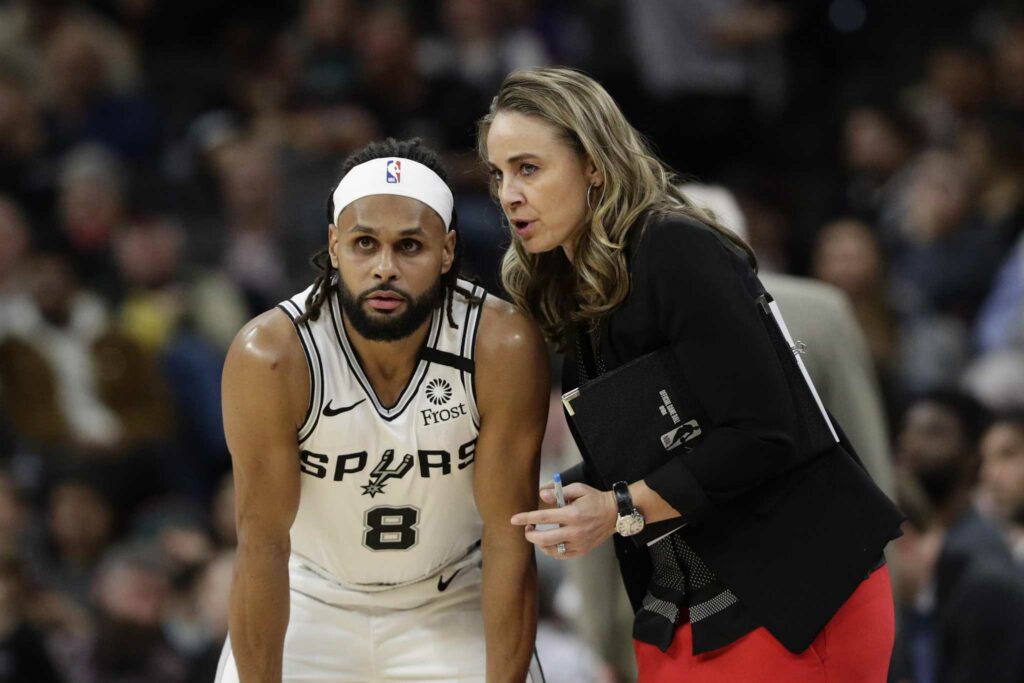Have you ever wondered how the different genders in your life have influenced you? Have you ever wondered what would be different about your experiences, growth, or development due to these factors? Communication is the main avenue that molds our perceptions of gender. It is the backbone of our relationships, interactions, and experiences. We have all grown up having biases due to personal experiences and the opinions of those around us. Gender communication is present in many areas and a big one is in coach-athlete relationships. There must be effective communication in this relationship, as all others, and there is the pressing question whether there gender barriers in a coach-athlete relationship and what do they look like?
With coaches playing a fundamental role in the physical, technical, and psychological improvements of their players, an observation can be made based on the background of the coach. However, the knowledge and experience of the coach is not the sole determining factor in the performance of an athlete as the sports world is composed of various interpersonal perceptions.1 Since the implementation of Title IX in 1972, there has been a large increase in female participation within all sports. In the early 1970s, the number of female athletes across high school sports was just 300,000 and increased to 3.2 million by 2011, and college athletes increased from 30,000 female athletes to over 193,000. However with this increase in female participation in high school and collegiate sports, there has not been a corresponding increase in female coaching. In 1972, women’s teams were coached by females about 90% of the time and that percentage has dropped to only about 43% today.2 With this large increase in male lead, female teams, the topic of coach-athlete relationships must be brought up to discuss the physical and psychological effects it has on an athlete.

The first step in understanding the relationship between a coach and an athlete is knowing why participation occurs in the first place. Sport groups are composed of individuals who have chosen to put in an effort, both mental and physical, to receive in return both physical and non-physical “rewards.”3 The overall traditional nature of the male versus female argument is viewed from the standpoint of looking at the traditional profiles of each gender. Males are typically viewed for their aggressive and competitive nature and females are viewed for their empathetic nature. The stereotype of these traditional profiles is then brought into the sporting world and places an “invisible” boundary holding women back from entering the coaching atmosphere. For example, a female coach in a male sport might be seen as unintelligent or incompetent due to the job they were hired for. This stigma has a definite impact on female coaches’ desire to pursue coaching positions in professional settings.4 One of the first women to truly overcome this boundary is Becky Hammon, a former WNBA All-star, who at age 37 became the first paid, full-time female assistant coach in NBA history. She then went on to become the WNBA’s head coach of the Las Vegas Aces where she was named the 2022 WNBA Coach of the Year award. This had a beneficial impact on the players as they all looked up to her due to the fact she had been in the athletes’ shoes before. A certain level of trust was instantly formed between her and her players due to this.5 Hammon left her NBA coaching job with the San Antonio Spurs to go to the Las Vegas Aces and received backlash that stated she was stepping down in her career. Hammon made a very prominent statement by saying, “I think it’s an ignorant statement. To think I’ve outgrown the WNBA in a coaching capacity is ridiculous. I’d rather be a coach in the WNBA and have my own organization and be running a team.” She recognizes that women are getting hired in many different positions across professional sports leagues as there are still a half dozen assistant women coaches in the NBA.6Hammon’s coaching style goes against the traditional views of women in society, as she has been described by one of her players, Kelsey Plum, as “incredibly intelligent with large expectations.” She holds the same expectations across all her players with an empowering and uplifting mindset. The effects of this on the players are very substantial and beneficial both to their physical performance and their mental status.

Through various studies it has been shown male coaches are more often labeled as being very direct and to the point with their explanations, comments, and thoughts on an individual’s actions. For example, they would tell individuals what they needed to know and when they needed to know it. They would hold team discussions containing an emphasis on team goals while having an absence of emotional context. It has also been found that male coaches have large expectations for the female athletes, however are much more compassionate in understanding mistakes. With a quote from a female athlete with a male coach being, “I expect you to make mistakes, but as long as you learn from them and keep going, then that’s good,” this shows how a female’s male coach treated her with empathy and respect.7 The large sense of expectation present from male coaches in sports is truly a double edged blade. It sets a large precedent on the athletes that motivates them to perform to this high standard, further improving performance. However, it is also the large sense of expectation that causes stress to form within an athlete at the thought of letting their coach down.

Through the different studies it is clear there is a large desire for a firm coaching style more commonly associated with male coaches, however the relationship female athletes are able to form with female coaches is also of high interest in the eyes of a female athlete. The relationship between a coach and an athlete is a very fragile bond of trust that is used for the betterment of the athlete as a whole. Coaches are often times seen as mother or father figure in which for example, an athlete could talk about things affecting them in their personal life. However there is the possibility of there being a disconnect that exists between male athletes and female coaches, and vise versa, due to a feeling of concern at the possibility of putting their coach in an uncomfortable position. The way a coach communicates with an athlete both at and away from an athletic venue has a large wave of influence on the way an athlete thinks of and respects their coach. There is a large wave of data that exists showing that as the coach-athlete relationship improves, an improvement in athletic performance will also occur.8
At the end of the day everyone is going to have their own preconceived notions about what is better to them, regardless of any stereotypes or gender barriers that may exist. An athlete has the liberty of choosing who they want to coach them and it is their job to decide what qualities they would like their coach to possess. It is at an athlete’s discretion what coaching styles they prefer and what traits they value and respect. For a lot of athletes, these qualities look like empathy and effective communication. This can be generalized amongst most all other relationships as well. Everyone appreciates feeling valued, respected, and cared for, regardless of what gender in that individual looks like.
- Murray, Paula, Rhiannon Lord, and Ross Lorimer. “The Influence of Gender on Perceptions of Coaches’ Relationships with Their Athletes: A Novel Video-Based Methodology.” The Sport Journal. United States Sports Academy, August 30, 2018. ↵
- Dusenbery, Maya. 2017. “Charts: The State of Women’s Athletics, 40 Years after Title IX.” Mother Jones. June 25, 2017. ↵
- Whitaker, G., & Molstad, S. (1985). Male Coach/Female Coach: a Theoretical Analysis of the Female Sport Experience. Journal of Sport and Social Issues, 9(2), 14–25. ↵
- Thompson, Karly, Tyler Terron, and Steve Shih-Chia Chen. “Breaking down Barriers: An Investigation into the Lack of Female Head Coaches in NCAA Affiliated Institutions.” Kentucky SHAPE Journal. Kentucky Association for Health, Physical Education, Recreation, and Dance, 2020. ↵
- Sky Sports. “WNBA: Becky Hammon Coaching Success with Las Vegas Aces Having League-Wide Impact.” Sky UK, July 15, 2022. ↵
- Feinburg, Doug. “Becky Hammon: It Was Easy Decision to Leave NBA, Return to WNBA.” NBA. The Associated Press, January 18, 2022. ↵
- Rima, Melissa, Rory Weishaar, Brian McGladrey, and Erica Pratt. “An Exploration of Female Athletes’ Experiences and Perceptions of Male and Female Coaches: Ten Years Later.” The Sport Journal. United States Sports Academy, May 9, 2019. ↵
- Bo Hanson. “Athlete Assessments | the Coach Athlete Relationship Is a Performance Factor.” Athlete Assessments, July 17, 2018. ↵




15 comments
Gaitan Martinez
One of the modest aspects of the modern world is how progressively we’re advancing because we’re starting to break old traditions and reflect on the past. For example, a woman’s natural role was to be a housewife back in the 20th century. Now we’re breaking away from those stereotypes and encouraging everyone to be who you want to be. So does it really matter if a boy’s basketball team has a female coach? No. What if they switched roles? Still no.
Carlos Alonzo
Understanding the differences in male and female coaching is very important for learning the best coaching methods. Although, gender stereotypes are not the primary factor affecting coaching strategies, because everyone has strengths and weakness that need to be met to be successful. I appreciate the article because essentially it highlights the importance of tailoring strategies to meet the needs of athletes.
Illeana Molina
Congratulations on your nomination! I love the image and strong title that has hooked me to continue reading. I do hear about issues with Title IX occurring, and it is unfortunate. I know it began in the 70s and females within sports are widely affected. Gender concepts and analysis is huge within every industry but we are seeing all aspects of the evolution of gender in all lights. This is articulated beautifully and I look forward to many more comments on your piece. Great Job!!
Aaron Astudillo
Congratulations on being nominated and published Bailey! This is a well-written piece that shines a light on the gender concepts that goes on within the area of sports. I am about to finish my gender politics class, and it is interesting to see how some of the topics that we have reviewed is applicable.
Karicia Gallegos
Congrats on your nomination! This well-written, intelligent piece puts light on the sometimes ignored subject of gender inequalities in teaching approaches in sports. By comparing the advantages and disadvantages of male and female coaching approaches, you provided a fair viewpoint. I liked how you used actual examples to highlight the various coaching philosophies. Overall, I really liked this article, great job!
Peter Alva
Becky Hamon is the GOAT of every female coach I have watched. I personally used to have a female baseball coach and I do think that women’s sports are a lot more mentally draining than men’s sports at times. Back to Hamon, I don’t know what it is but looking at her adjustments and the way she approaches the game you can just tell she sees it so much more differently. AMAZING article and congrats on the nomination!!
Isabel Soto
This article was well written and discusses issues we face today. Since the implementation of Title IX in 1972, there has been a large increase in female participation within all sports. It’s very true that there is a strong bond between players and coaches, and they consider them as their father or mother. It’s never about he/she, it’s all about what he/she says, and it is all about empathy and effective communication and it is always open choice to choose coach.
Sydney Nieto
Congratulations on having your article nominated. As an athlete I’ve never given much thought to this topic, but this was an interesting article. I didn’t know that there was more women coach in the 1970, which surprised me because I thought it would be the opposite. Looking at the differences in scales and how they work differently for male and female groups was interesting.
Guiliana Devora
This is an incredible story and the author did an amazing story of telling it. Congratulations as well on the nomination. I think it is an interesting topic on how male and female genders influence our world and how we respond to situations. I think it is crazy to think about how things would be different if a prominent figure in my life was a different gender, and how differently it would affect me.
Madison Magaro
This was a very interesting article and the author did a great job at putting it together. Communication between an athlete and their coach is a very important factor to be successful in a sport. I think it is so true that male coaches are very direct and do not really form that connection with the player. Overall this was a great read and the author found really good information.